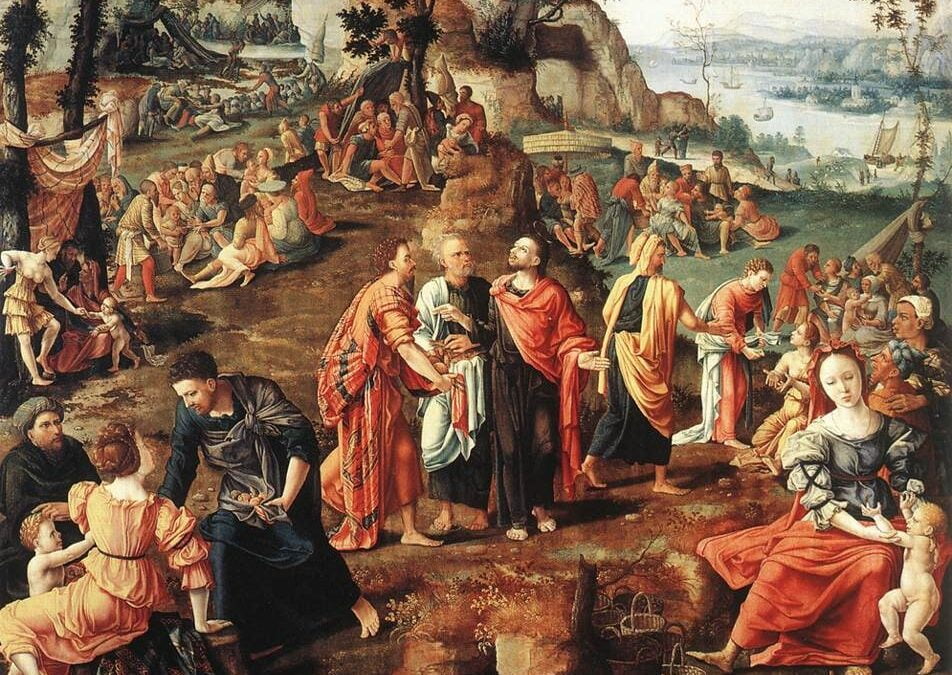We have been told that any church that does not have an active, organized, ongoing ministry to feed the poor in its community is not doing what Jesus commands it to do. Is this true? Not really.
Jesus had a lot to say about the poor, to be sure. But everything he had to say about the poor, like pretty much everything he had to say about anything, was based on and steeped in the teachings of the Old Testament. In particular, his repeated reference to one specific prophecy from Isaiah is foundational. Both Matthew and Luke let us know that immediately after his baptism in the Jordan and his temptation in the desert, Jesus went to Galilee to start his ministry. He proclaimed the Kingdom of God, called disciples, healed the sick, cast out demons, and spoke in the synagogues of many Galilean towns. Luke describes for us Jesus’ inaugural sermon in his own synagogue, in his hometown of Nazareth. We read about it in Luke 4:14-30.
Famously, he reads from Isaiah 61 and claims that the prophecy of that passage is fulfilled in himself. Much has been made of this address, and properly so. All we will do here is notice what Jesus says about why the Holy Spirit was upon him and what he came to do. As Luke tells it, Jesus says that the Holy Spirit is upon him to empower him to be Israel’s Messiah and rescue them from the moral poverty and spiritual slavery that afflicted them. He particularly rebukes their unbelief and prophesies the extension of the gospel of the Kingdom to the Gentiles. Look it up!
There is another vitally important reference Jesus made to Isaiah 61, not long after his inaugural sermon in Nazareth. He answered a query from his cousin John, commonly called the Baptist, who had been put in prison for criticizing the king. We can read about it in Luke 7 or Matthew 11. Look them up! This is obviously not a verbatim quotation, but it’s still a clear allusion, specially focused on the idea of “good news preached to the poor.” This reliance on Isaiah 61 drives us to go back and look at the passage itself.
So read Isaiah 61:1-7, or better yet the whole chapter, or everything from chapter 40 on. What is unmistakable is that these words of hope for a coming Messiah are directed at Israel. The poor who need good news, the brokenhearted who need to be bound up, the captives who need to be set at liberty, are Israelites, the people of Judah, either in exile in Babylon or returned from Babylonian exile to their own homeland in Judea — now under the Persian thumb instead of the Babylonian. Christians, who believe that Jesus of Nazareth was and is the Messiah of the Jews, read these words on Jesus’ lips in his own synagogue and hear him clearly claiming to be the Messiah. The poor, helpless, afflicted, captive people he is talking to and about are the entire population of Judea and Galilee at his own time, oppressed by their Roman occupiers. They would have seen the poverty and powerlessness that afflicted them as primarily political in nature. Jesus sees it as primarily moral and spiritual, and offers himself as the solution to their problem. He will feed those who are dealing with physical hunger because he wants them to know that their spiritual thirst and hunger can only be satisfied in him. He will free those who are enslaved to sin and Satan by forgiving sins and casting out demons. He will rescue those in the grips of sickness and death by performing literal (but temporal) healings, as tokens and promises of the eternal and permanent healing to come. In other words, the foundational event introducing the idea that Jesus came to preach good news to the poor clearly is about spiritual and moral poverty, far more than financial or physical poverty.
This is not to say that Jesus did not care for the poor. That’s ridiculous. He cared for everybody, always. And like any of the Hebrew prophets that came before him, he cared passionately about the many ways the wealthy have oppressed the destitute throughout history. However, physically feeding the physically hungry was always something he did as an object lesson of the spiritual truth of our spiritual starvation and moral poverty, and his mission to rescue us out of it. He always made it abundantly clear that he himself was the bread that the people really needed. The loaves and fishes were only there to drive home the point of his own great love. To imagine that they were the point is to miss the point pretty badly.
People have pointed to Matthew 25:31-46 or Mark 10:17-27 or Luke 14:12-14 or any number of other passages to show that Jesus cared about the poor, and well they should. But a careful look at all of what Jesus said about the poor will show us that his great concern for them is the same as his concern for everyone: we are all sinners in need of repentance and forgiveness. The gospel he came to preach for the poor is the same as the gospel he preaches to everyone: “I am here to give myself as the sacrifice for your sins. Now repent and believe and follow me.”
Is this to say that we should never concern ourselves with reaching out to the poor? That’s absurd. Jesus calls us to reach out to everyone with his love and his gospel every day, every chance we get. And he and his apostles have specific commandments for his churches about how we should treat the poor. However, putting food in every mouth on the block is not one of them. Look for more about this at Gudnews4all | Substack

